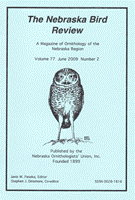Nebraska Ornithologists' Union

Nebraska Bird Review
Date of this Version
12-2004
Document Type
Article
Citation
Nebraska Bird Review (December 2004) 72(4).
Abstract
Does birding have a future?
Now this might seem an odd question, even an absurd question, to pose to an audience like this, and the answer might seem obvious. How could birding not have a future when we, all of us, are birders who bird, and when survey after recent survey assures us that our numbers are growing, our diversity increasing, and our economic and ethical contributions to American society ever more conspicuous. Does birding have a future? The simple answer is yes.
That's the simple answer. The more interesting answer is yes-yes, but. Yes, birding has a future, but that future is, I believe, not likely to look much like the sport's present. In some ways, it will resemble elements and phases of our past; in other ways, ways that we cannot foresee, it will be unlike anything we have known.
These general statements could apply to the development of just about anything human, of course. What is unique and I think greatly to our advantage, though, is that as birders at the beginning of the twenty-first century we actually have some choices about which elements of the past we wish to carry along with us into the future. And if we make those choices wisely, in full awareness of what present-day birding is, how it became what it is, and why it is facing-must face-the necessity of change-if we are aware of all these factors, we can make thoughtful choices, I believe, that will not only insure the sport's persistence into the next hundred years, but make birding a more attractive pastime for newcomers, a more valuable contribution to what we call science, and a more influential force in the negotiation of environmental policy in this country and around the world.


Comments
Copyright 2004, Nebraska Ornithologists' Union. Used by permission.